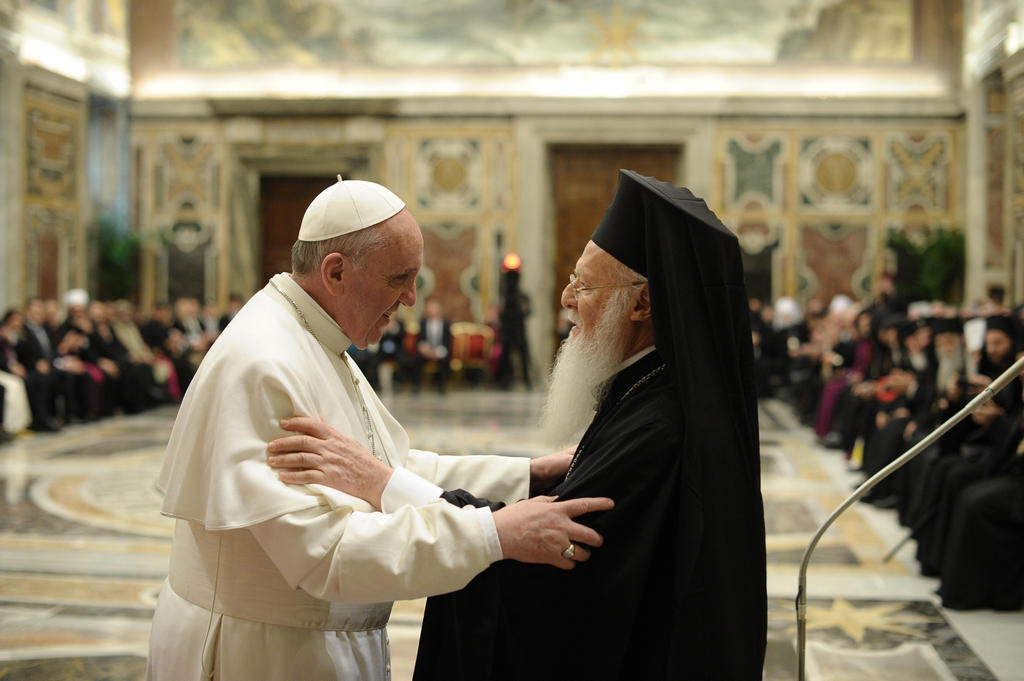Source: National Catholic Register
The Hope for Ecumenical Unity Includes the Desire for a Reconciliation of the Gregorian and Julian Calendar
In an ongoing dialogue with Ecumenical Patriarch Bartholomew of Constantinople, the successor of St. Andrew the Apostle and “first among equals” among the bishops of the Eastern Orthodox Church, Pope Francis has expressed his belief that Catholics and Orthodox will one day attain full communion. Eastern Orthodox — as opposed to Eastern-rite Catholics who differ from Latin-rite Catholics in custom and liturgical practices but accept the primacy of jurisdiction of the Bishop of Rome — gradually separated from Rome in the Middle Ages and are today composed of a variety of Orthodox churches, the largest of which is the Russian Orthodox Church with nearly 100 million members. Orthodox and Catholics both accept the first seven Ecumenical Councils of the Church as well as the seven sacraments and apostolic succession, but differ in key areas as well, most notably the primacy of the pope.
Another notable area of difference between them is the date of Easter. In 2024, Catholics and much of the rest of the world celebrate Easter on March 31, while the Orthodox celebrate Easter on May 5. The difference is due to the fact that most Orthodox churches use the Julian calendar introduced by Julius Caesar in 45 B.C. and the Catholic Church uses the Gregorian calendar introduced by Gregory XIII’s 1582 papal bull Inter Gravissimas (“Among the Greatest Concern”). Developing an accurate calendar can be a challenge, as a year or amount of time it takes the earth to make a complete revolution around the sun cannot be neatly organized into days and months. Such a revolution takes nearly a quarter of a day longer than 365 days, so calendars must be adjusted for this difference or be increasingly off year-to-year. Both the Julian and Gregorian calendars were efforts to account for the movements of the sun and the moon, with the Gregorian calendar being the more successful effort to do so.
Easter, or the celebration of the resurrection of Our Lord, is the most important of all liturgical times, however, in the earliest centuries, the Christian churches celebrated it on different dates. The First Ecumenical Council of Nicaea of 235 resolved the issue by decreeing that the universal Church would celebrate Easter on the first Sunday after the full moon following the beginning of Spring. Hence, year-to-year, the earliest possible date for Easter could be March 22 and the latest April 25.
Errors in the Julian calendar in use at the time, however, became evident, as the calculated year was too long by 11 minutes and 14 seconds. Church leaders were aware of this inaccuracy and believed that not celebrating Easter on the precise day indicated by the Council of Nicaea was a scandal. (The inaccurate calendar created problems in the secular world as well, adversely affecting the timing of the planting of crops and the navigation of ships during different seasons of the year.)
Seeking to correct the problem, Pope Gregory XIII via a papal bull removed 10 days from the calendar in 1582. People went to bed Oct. 4 and woke up Oct. 15. (Hence, the Julian calendar falls behind the Gregorian calendar, about 13 days currently, but increasing to 14 days in 2100.)
Catholic countries such as Spain, Italy, Portugal and the Polish-Lithuanian Commonwealth and the Spanish colonies immediately adopted the new calendar. Protestant countries began adopting it in the 1700s, including colonial America in 1752. Holdouts included Russia, which remained on the Julian calendar until 1917, and Greece, which remained on the Julian calendar until 1923.
While many Orthodox churches accept the Gregorian calendar for fixed religious feasts, all except the Orthodox Church of Finland use the Julian calendar for movable feasts such as Easter. In recent dialogue with Pope Francis, however, Ecumenical Patriarch Bartholomew indicated his support for finding a common Easter date, believing the first such common date should be in 2025. However, the possibilities for success may be remote, due to fracturing within the Orthodox church community. In 2018, for example, the Russian Orthodox Church announced that it had severed ties with the Ecumenical Patriarchate of Constantinople after Bartholomew confirmed he intended to recognize the independence of the Orthodox Church of Ukraine. Father Hugh Barbour of St. Michael’s Abbey in Southern California added that Russia’s 2022 invasion of Ukraine has created further divisions between leaders of Orthodox churches and the Ukrainian government, which wants to impose a change over to the Gregorian calendar for fixed feasts on the Orthodox church “exacerbating the situation horribly and setting back any hope of reunion within Orthodoxy.”
Regardless of the political situation, Father Hugh continued, while worldwide reunion is desirable it will more likely be attained “bit by bit on a local level.” He explained, “While Orthodox churches have the same faith and worship, showing marvelous coherence in liturgy and the doctrine of the faith, their jurisdictions are local and national rather than universal. This decentralized power structure makes them hard to deal with ecumenically. The Catholic Church, in contrast, is a papal monarchy able to act from a single center.”
He added that while the date of Easter has a symbolic importance, it is not the key issue that papal primacy is. He said, “The Roman Church historically never has had any difficulty with Eastern Catholics using the older Julian calendar if they desire. In fact, there are some benefits.” The observance of the Orthodox or Julian date of Christmas on Jan. 7, as well as the different Easter date, separates them from the secular, commercialized observance of such holidays “making them more tranquil and exclusively religious. That’s often why they like it.”
He continued, “What is more, the witness to unity in Christian worship has already been asserted recently in the Holy Land where the Catholic Latin Patriarchate of Jerusalem has largely adopted the Julian ‘Orthodox’ date of Easter so that all the Christians of the Apostolic Jurisdictions there show unity in a place where unity is crucial to their survival. This is a deep reason to consider a common date of Easter, suggested already by the Second Vatican Council 60 years ago.”
Jim Graves Jim Graves is a Catholic writer and editor living in Newport Beach, California. He previously served as Managing Editor for the Diocese of Orange Bulletin, the official newspaper of the Diocese of Orange, California. His work has appeared in the National Catholic Register, Our Sunday Visitor, Cal Catholic Daily and Catholic World Report.




1 Comment
In my view, Rome’s Pascha calendar also has issues. They often forget to have it after the Jewish (Seven Day) Feast of the Passover, and have Pascha a few days after the first day of Passover.
I am convinced from reading Eusebius’s Ecclesiastical History that the intent of the Fathers of the 1st Ecumenical Council was to have a solar correct date of Pascha by celebrating it on the “Sunday immediately following which was nearest after the vernal Equinox”. For the calculation of this date, the best mathematicians of the time were given the job of calculation for future date, unfortunately the calculations of the Equinox after a few hundred years. Today we can accurately know the equinox and the new moon. The Church should use the best calculations of our day to determine Pascha.
Here is an excerpt from an article from a small OCA monastery concerning the correction of the calendar:
“For all its greatness, the Julian Calendar has a slight discrepancy with the solar cycles of the sky. Over time, this minute flaw had its effect, one which the- Byzantine astronomers noted clearly: namely, that the dating of the days was out of sync with the motions of the heavens. Under Ottoman oppression, however, calendar modification was put on the backburner.
One hundred years ago, another opportunity arose. During a council in 1923, the Serbian genius Milutin Milankovi presented his leap-year corrective, spurring several Orthodox Churches to revise the Julian calendar. This entailed a thirteen-day leap forward in order to more fully accord with the sidereal cycle. Unfortunately, in a folly of judgment, they took but half-measures and retained the old Julian calendar’s reckoning of the spring equinox for determining Pascha. Thus, this bifurcated calendar has two spring equinoxes (manifesting a complete disharmony) with creation whereas the correction originally suggested by Dr. Milankovic is genius and in accord with the wisdom of the heavens. A confused mess has resulted. Waging ideological warfare, we pit a disintegrated ‘Revised Julian’ calendar which insults our God-given human reason against an uncorrected Julian calendar which has lost step with the heavens.
We Orthodox speak theologically and most profoundly about Christ manifest in the cosmos, for we know that the contemplation of the work of His Hands orders the soul to its highest good. The Church also has, however, the charism to witness to this truth in her praxis, to do what She preaches. For this reason, let us use the calendar schism as a goad unto repentance, wherein we may move from calendric chaos to heliotic harmony, from fluorescent frenzy to concord with the cosmos, and from diabolic disintegration to a reintegration of relation with creation”.